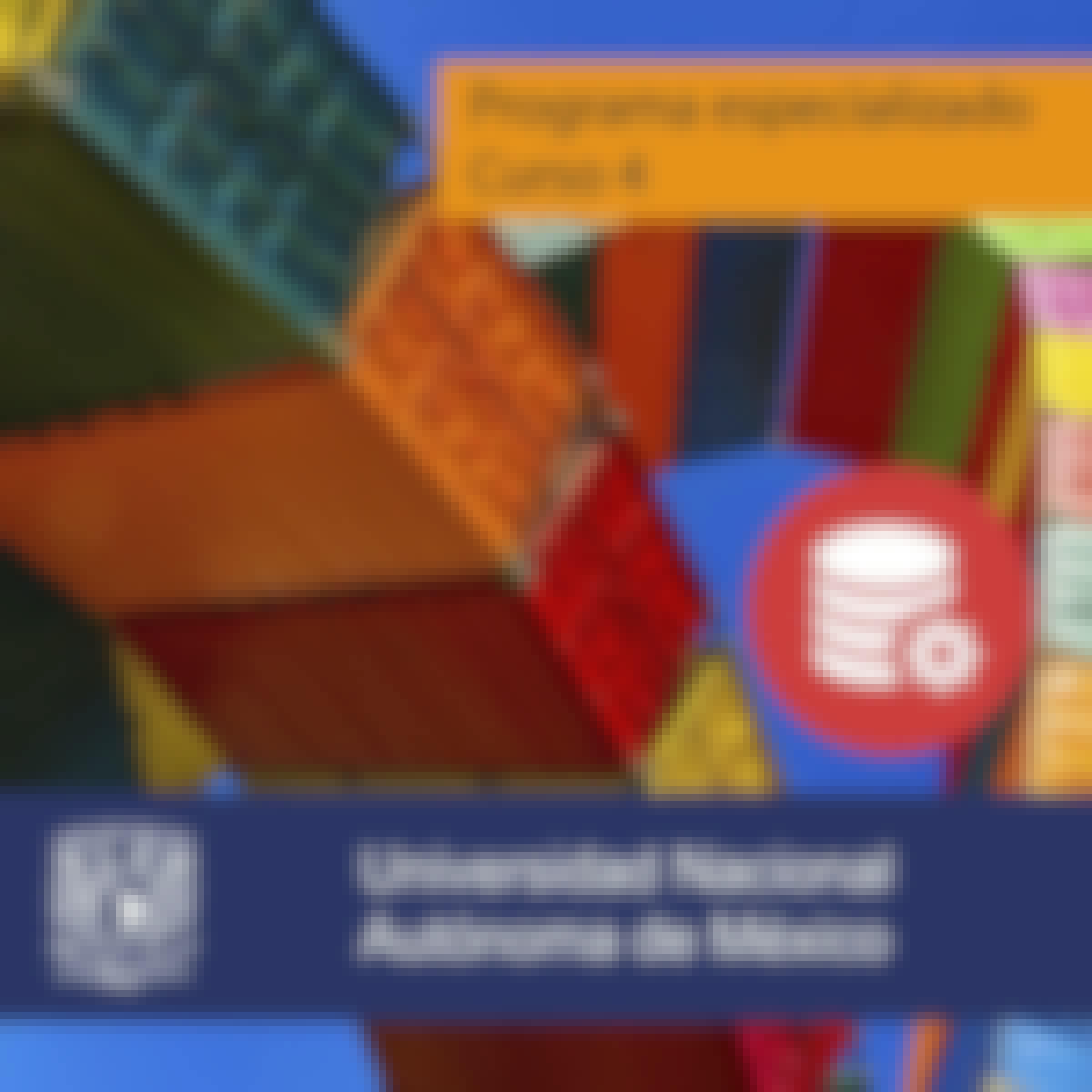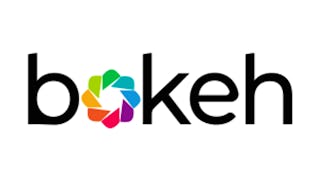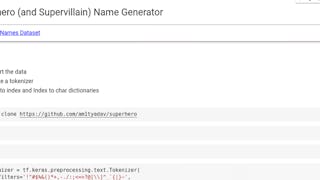- Browse
- Object Oriented Programming
Results for "object oriented programming"
 Status: Free TrialFree TrialU
Status: Free TrialFree TrialUUniversidad Nacional Autónoma de México
Skills you'll gain: Data Mining, Database Design, Scalability, Database Systems, Relational Databases, Unstructured Data, Transaction Processing, Databases, Systems Design, Big Data, Data Architecture, NoSQL, Data Processing, Maintainability, Software Design, SQL, Apache Hadoop
4.3·Rating, 4.3 out of 5 stars39 reviewsIntermediate · Course · 1 - 4 Weeks
 C
CCoursera
Skills you'll gain: Spatial Data Analysis, Data Visualization Software, Data Visualization, Geospatial Mapping, Geospatial Information and Technology, Interactive Data Visualization, Scatter Plots, Software Installation, Python Programming
4.1·Rating, 4.1 out of 5 stars16 reviewsIntermediate · Guided Project · Less Than 2 Hours

Skills you'll gain: Tensorflow, Natural Language Processing, Python Programming, Machine Learning Methods, Recurrent Neural Networks (RNNs), Data Preprocessing, Artificial Neural Networks, Machine Learning, Deep Learning
4.7·Rating, 4.7 out of 5 stars38 reviewsIntermediate · Guided Project · Less Than 2 Hours
 Status: Free TrialFree TrialU
Status: Free TrialFree TrialUUniversity of Colorado Boulder
Skills you'll gain: Real-Time Operating Systems, Systems Architecture, Software Design, System Design and Implementation, System Programming, Embedded Systems, Requirements Analysis, Linux, System Requirements, Verification And Validation, Real Time Data, Application Performance Management, Performance Testing, Computer Vision, Image Analysis, Debugging
3.8·Rating, 3.8 out of 5 stars8 reviewsAdvanced · Course · 1 - 3 Months
 Status: Free TrialFree TrialU
Status: Free TrialFree TrialUUniversidad Nacional Autónoma de México
Skills you'll gain: Digital Signal Processing, Musical Composition, Music, Electronic Components, Electronics, Music Theory, Hardware Design, Embedded Systems, System Configuration, Algorithms, Instrumental Music, Performance Tuning, Data Import/Export, Programming Principles, Generative AI, Digital Communications, Creative Design, Interoperability, Other Programming Languages, Development Environment
4.7·Rating, 4.7 out of 5 stars56 reviewsBeginner · Specialization · 1 - 3 Months
 Status: Free TrialFree TrialE
Status: Free TrialFree TrialEEdureka
Skills you'll gain: Tensorflow, Predictive Modeling, Machine Learning, Text Mining, Deep Learning, Natural Language Processing, Applied Machine Learning, Convolutional Neural Networks, Supervised Learning, Recurrent Neural Networks (RNNs), Artificial Intelligence, Classification Algorithms, Data Science, Data Preprocessing
3.3·Rating, 3.3 out of 5 stars32 reviewsBeginner · Course · 1 - 4 Weeks
 Status: Free TrialFree Trial
Status: Free TrialFree TrialSkills you'll gain: Restful API, Web Applications, Cascading Style Sheets (CSS), Application Programming Interface (API), Web Services, HTML and CSS, Back-End Web Development, JSON, Frontend Integration, Javascript, Software Development
Intermediate · Course · 1 - 4 Weeks
 Status: Free TrialFree TrialU
Status: Free TrialFree TrialUUniversity of California San Diego
Skills you'll gain: Student Engagement, Algorithms, Diversity Awareness, K-12 pedagogy, Facebook, Instructional Strategies, Programming Principles, Data Storage, Software Engineering, Geographic Information Systems, Image Analysis, Lesson Planning, Computer Science, Theoretical Computer Science, Social Impact
Beginner · Course · 1 - 3 Months
 Status: Free TrialFree TrialU
Status: Free TrialFree TrialUUniversity of California San Diego
Skills you'll gain: Software Design Documents, System Design and Implementation, Internet Of Things, Technical Documentation, Technical Communication, Mobile Development, Test Case, System Testing, Software Development, Wireless Networks, Embedded Systems, Systems Integration
4.8·Rating, 4.8 out of 5 stars13 reviewsMixed · Course · 1 - 4 Weeks
 Status: PreviewPreviewC
Status: PreviewPreviewCCoursera
Skills you'll gain: JavaScript Frameworks, React.js, Application Development, Application Deployment, Web Applications, Front-End Web Development, Web Development Tools, Web Development, Routing Protocols, Responsive Web Design, Server Side
4.5·Rating, 4.5 out of 5 stars28 reviewsBeginner · Course · 1 - 4 Weeks
 Status: Free TrialFree TrialU
Status: Free TrialFree TrialUUniversity of Illinois Urbana-Champaign
Skills you'll gain: Deep Learning, Applied Machine Learning, Generative Adversarial Networks (GANs), Healthcare Project Management, Machine Learning Methods, Image Analysis, Graph Theory, Artificial Neural Networks, Convolutional Neural Networks, Health Informatics, Autoencoders, Recurrent Neural Networks (RNNs), Predictive Modeling, Unsupervised Learning, Python Programming
3.6·Rating, 3.6 out of 5 stars15 reviewsAdvanced · Course · 1 - 4 Weeks
 Status: PreviewPreviewU
Status: PreviewPreviewUUniversity of Michigan
Skills you'll gain: Hypertext Markup Language (HTML), Web Content Accessibility Guidelines, HTML and CSS, Web Design, Web Design and Development, Semantic Web, Usability, Web Applications, Programming Principles, Web Content, Verification And Validation
4.6·Rating, 4.6 out of 5 stars49 reviewsMixed · Course · 1 - 4 Weeks
Searches related to object oriented programming
In summary, here are 10 of our most popular object oriented programming courses
- Designing data-intensive applications: Universidad Nacional Autónoma de México
- Data Visualization using Bokeh: Coursera
- Create a Superhero Name Generator with TensorFlow: Coursera
- Real-Time Project for Embedded Systems: University of Colorado Boulder
- Programación musical con software libre: Universidad Nacional Autónoma de México
- Machine Learning and NLP Basics: Edureka
- API Basics 2: Build a Blog (REST, URLs & HTTP Requests): Scrimba
- Teaching Impacts of Technology: Relationships: University of California San Diego
- Internet of Things Capstone V2: Build a Mobile Surveillance System: University of California San Diego
- Introduction to Next.js: Coursera










